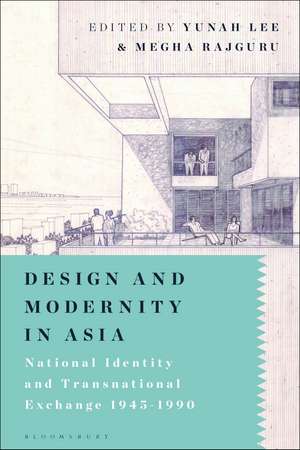Design and Modernity in Asia: National Identity and Transnational Exchange 1945-1990
Editat de Yunah Lee, Megha Rajguruen Limba Engleză Hardback – 19 oct 2022
Preț: 542.43 lei
Preț vechi: 691.45 lei
-22% Nou
Puncte Express: 814
Preț estimativ în valută:
103.81€ • 107.98$ • 85.70£
103.81€ • 107.98$ • 85.70£
Carte disponibilă
Livrare economică 24 martie-07 aprilie
Preluare comenzi: 021 569.72.76
Specificații
ISBN-13: 9781350091481
ISBN-10: 1350091480
Pagini: 256
Ilustrații: 50 bw illus
Dimensiuni: 156 x 234 mm
Greutate: 0.66 kg
Editura: Bloomsbury Publishing
Colecția Bloomsbury Visual Arts
Locul publicării:London, United Kingdom
ISBN-10: 1350091480
Pagini: 256
Ilustrații: 50 bw illus
Dimensiuni: 156 x 234 mm
Greutate: 0.66 kg
Editura: Bloomsbury Publishing
Colecția Bloomsbury Visual Arts
Locul publicării:London, United Kingdom
Caracteristici
Impressively international line up of contributors from France, India, Japan, the Netherlands, Singapore, South Korea, the UK and the US
Notă biografică
Yunah Lee is Principal Lecturer and teaches History of Art and Design at the University of Brighton, UK. Her research interests are design history and material culture in Korea and East Asia, transnational and cross-cultural studies of modernity and modernism, representations of national and personal identities, and political agencies and cultural diplomacy of art and design. She is based at the Centre for Design History at the University of Brighton and is a founding member of the Korean Design History Society since 2019.Megha Rajguru is Principal Lecturer and teaches History of Art and Design at the University of Brighton, UK. Her research is in South Asian design history, material and visual culture. She has published articles in the Journal of Design History, Studies in the History of Gardens & Designed Landscapes, Journal of Museum Ethnography and the Journal of Visual Arts Practice. She is based at the Centre for Design History at the University of Brighton and has recently acted as a Trustee and Teaching and Learning Officer of the Design History Society, UK.
Cuprins
List of FiguresList of ContributorsForeword, Gyan Prakash (Princeton University, USA)Introduction: Approaching Modern Living in Asia, 1945-1990, Yunah Lee and Megha Rajguru (University of Brighton, UK)Constructing National Identities1. 'Japanese Modern': a Post-War Japonisme Crusade, Yasuko Suga (Tsuda University, Japan)2. Modernization of Turkey Through Mid-Century Modern Furniture, Deniz Hasirci (Izmir University of Economics, Turkey) and Zeynep Tuna Ultav (Yasar University, Turkey)3. A Distanced Modernism: Identity and Authoritarianism via Academic Campus Architecture in East Pakistan 1958-1971, Ziad Qureshi (University of Houston, USA)Modernity and Public Spaces4. Leisure for the Modern Citizen: Swimming in Modern Singapore, Jesse O'Neill and Nadia Wagner (Glasgow School of Art, UK)5. From Hygienic Modernity to Green Modernity: Two Modes of Modern Living in Hong Kong Since the 1970s, Loretta I.T Lou (University of Oxford, UK)6. Imagining Cultural Modernity in the Global Nation: South Korea and the National Museum of Modern and Contemporary Art (MMCA), Ilmin Nah (Université Paris, France)Modern Living Discourse and Print Cultures7. Concrete Designs for Living Proposed by Marg Magazine: the Materiality and Political Economy of Modernism in India in the Early Years after Independence, Suchitra Balasubrahmanyan (Ambedkar University Delhi, India)8. 'To Live or Not to Live, That is the Question': Spatial Symbolism of Apartments in Korean Literature of the 1980s, Zhee Won Cha (Seoul National University, South Korea)9. Sweet Treats and Foreign Foods: Hanako Magazine, Food, and the Internationalized Women of the Japanese Bubble Economy, Hui-Ying Kerr (Nottingham Trent University, UK)Transnational Exchanges10. Cultural Politics of the Cold War and Living a Shibui Life, Izumi Kuroishi (Aoyama Gakuin University, Japan)11. The Modern Kitchen in Korea: Design, Modernity and Transnationalism, Yunah Lee (University of Brighton, UK)12. Locating Modern Living: Charles Correa, Asia and the Third World, Megha Rajguru (University of Brighton, UK)
